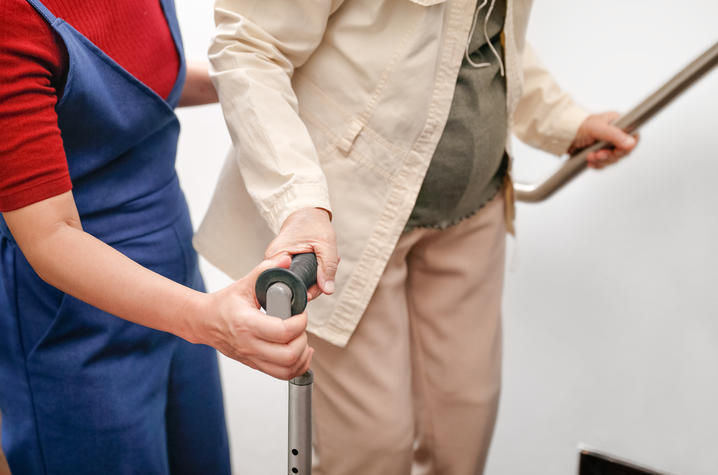Class Aiming to Prevent Falls in Older Kentuckians Going Virtual

LEXINGTON, Ky. (April 17, 2020) — About 30 million adults age 65 and older fall each year. According to the Centers for Disease Control and Prevention (CDC), about one in four, or 30%, of older adults in the United States report falling each year. That number is on par with the number of reported falls in Kentucky in 2016.
Amanda Rist, program and outreach coordinator for UK HealthCare’s Trauma Program Office, and her colleagues work to educate older Kentuckians on ways to prevent falls leading to traumatic injuries. Some of that work is done is through a class called “ThinkFirst for Falls” and it’s not just for older adults. Due to COVID-19, the class in now being offered virtually.
The first virtual “ThinkFirst for Falls” class is scheduled for 1 to 2 p.m., Friday, April 17. You can register for the class online. A second virtual class is scheduled for 1 to 2 p.m., May 4. If you’re interested in learning more about the "ThinkFirst for Falls" class, please email amanda.rist@uky.edu, or call the UK Trauma Program Office at 859-323-1116.
Falls are not a normal part of aging and experts do believe that most falls are preventable with the help of a doctor. There are, however, a number of risk factors that can make a person more susceptible to falls including lower body weakness, issues with balance, or vision problems.
Dr. Greg Jicha with the University of Kentucky’s Sanders-Brown Center on Aging says a number of diseases can contribute to the greater risk in older adults. “With the risk of Alzheimer’s disease and related dementias, Parkinson’s disease, ALS-Lou Gehrig’s disease and stroke steadily rising in prevalence among the aging population in the United States and across the globe today, comes a host of problems that place these patients in jeopardy. One of the major causes for disability and even death is the increased risk for falls attributed by these diseases. While we all understand that stroke and Parkinson’s disease, and even ALS, can contribute to falls, the latest research shows that more common diseases in the aging population such as Alzheimer’s disease, not previously thought to interfere with walking or balance, can be associated with increased risk for falls,” said Jicha.
Certain medications also cause greater risk. Jicha says there is currently research going on at Sanders-Brown studying a person’s gait as well as medication use.
“We have studied walking and balance with digital computerized measures that clearly demonstrate that not only is Alzheimer’s disease associated with fall risk, but that persons with normal cognition experiencing a buildup of Alzheimer’s disease plaques in the brain, nearly 1/3 of the aging population, are also at risk and this risk is increased dramatically if they are on an inappropriate medication that can further exacerbate these problems,” said Jicha.
Dr. Daniela Moga, Associate Professor of Pharmacy, is part of some of the ongoing research on this topic at UK. She says they are planning to evaluate how removing what they call “fall-risk increasing drugs” (FRID) can minimize the risk of falls. "FRID can impact daily function and quality of life beyond increasing the risk of falling. Some of these medications are prescribed by doctors to treat certain chronic conditions, but some are available as OTC. It is therefore essential for any older adult to always know what they are taking, and to check with their physicians, and pharmacist every time they add something new. In addition, even if nothing new gets added, they need to evaluate on a regular basis all of their medications- look at them holistically- and decide if the benefits of taking each one of them still outweighs the risks they might bring, including the risk of falls," explained Moga.
Experts say some older adults do not report a fall in the home out of fear of losing their independence. One fall doubles the chance of falling again. According to ThinkFirst, falls are the leading cause of unintentional injury deaths for people over age 65, and a leading reason for emergency room visits in the United States each year. Falls can cause brain injuries, hip fractures and other devastating consequences. Many falls could be avoided through simple preventative measures.
Anyone interested in preventing falls is welcome to join the virtual class. Rist says the topics the class covers include:
- Overview of the Brain
- Concussion Discussion
- Significance of Falls
- Fear of Falling
- Safety Inside the Home
- Community Safety
- Talking With Your Physician
- Nutrition
- Exercise
- Vision
- Medications
- Resources
As the state’s flagship, land-grant institution, the University of Kentucky exists to advance the Commonwealth. We do that by preparing the next generation of leaders — placing students at the heart of everything we do — and transforming the lives of Kentuckians through education, research and creative work, service and health care. We pride ourselves on being a catalyst for breakthroughs and a force for healing, a place where ingenuity unfolds. It's all made possible by our people — visionaries, disruptors and pioneers — who make up 200 academic programs, a $476.5 million research and development enterprise and a world-class medical center, all on one campus.




